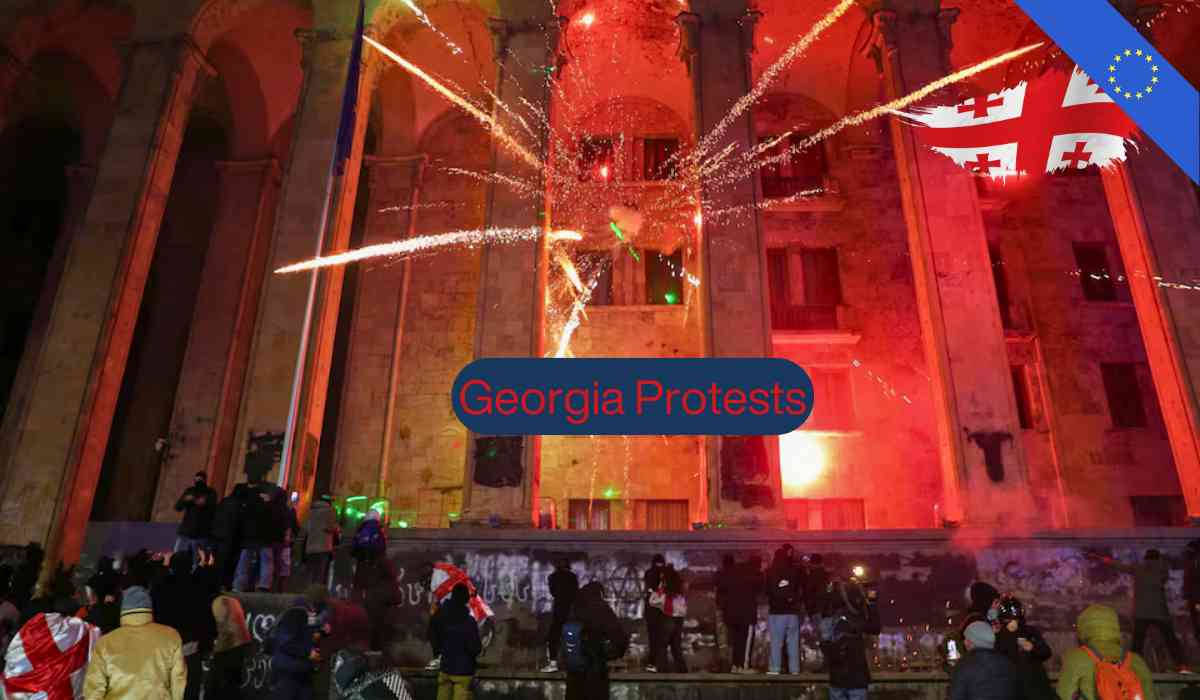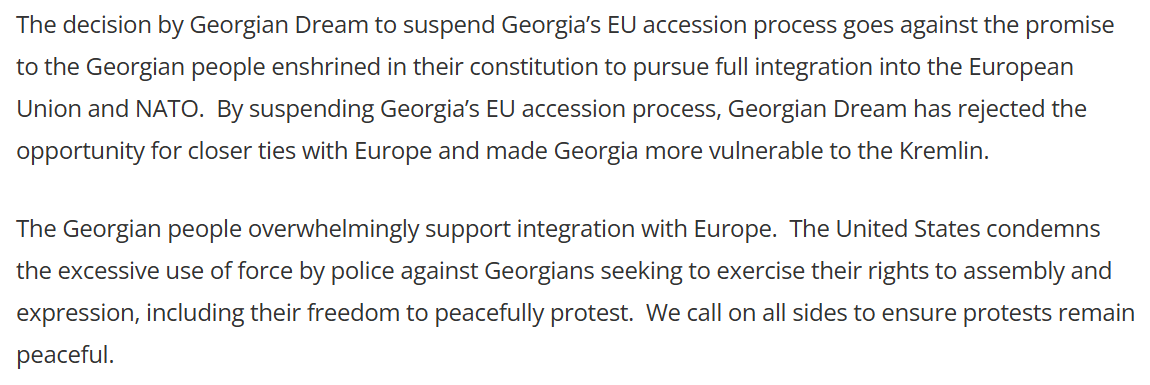Georgia - The political and social crisis that has hit Georgia is a result of its government suspending negotiations on EU membership until 2028. Controversially announced by the ruling party, Georgian Dream, the decision has prompted mass protests, brought international concerns, and added fears to Euro-Atlantic aspirations of the country.
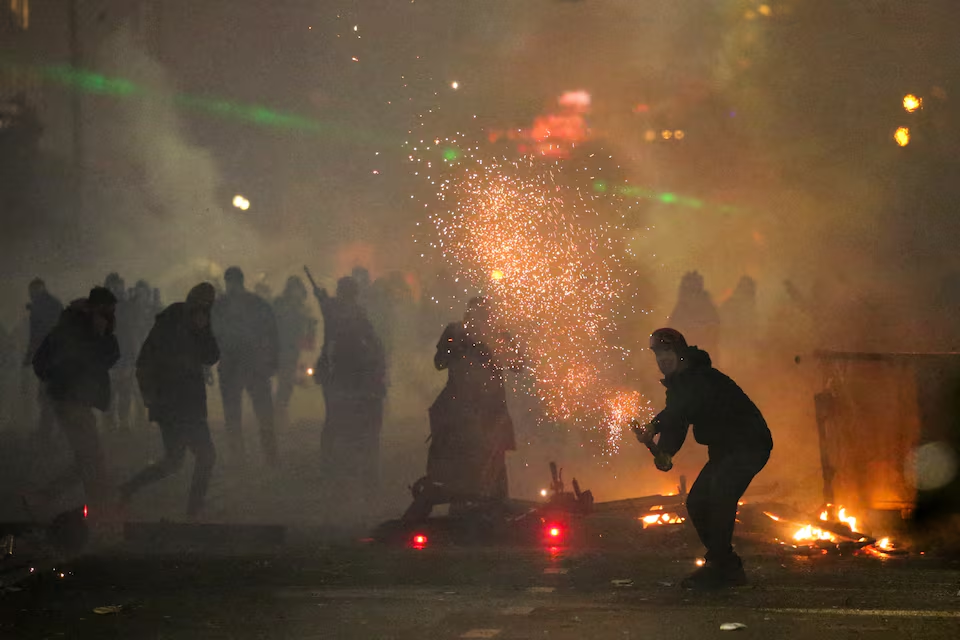
Mass Protests Across Georgia
Several thousand Georgians are out on the street in Tbilisi and other cities, demanding an overturn of the government decision. This is the fifth consecutive night of sustained mass demonstrations that have painted clashes against the police.
In Tbilisi, Rustaveli Avenue has become the stronghold of resistance, with demonstrators waving EU and Georgian flags, chanting, "We are Europe!" Protesters have blocked roads and are gathering in other cities such as Kutaisi, Batumi, and Poti over demands for snap elections.
The government's response has been ruthless—going riot police deployed tear gas, rubber bullets, and cannons of water to disperse crowds. Reports show over 150 accounts of protesters arrested, while at least 44 people were hospitalised.
"This government does not represent us. We do want to be a part of Europe, not backward," a protester in Tbilisi said, speaking for the many frustrations of the masses.

Georgia's Path to the EU Matters
To many Georgians, belonging to the EU is more than just a geopolitical goal; rather, it embodies for them democracy, economic stability, and independence from Russian influence.
Key milestones in Georgia’s EU journey include:
- June 2014: Signing the Association Agreement and Deep and Comprehensive Free Trade Area (DCFTA).
- March 2022: Submission of the EU membership application.
- June 2022: Recognition of Georgia’s European perspective.
- November 2023: Inclusion in the EU Enlargement Package reports.
- December 2023: Granting of EU candidate status.
International Reactions
European Union leaders said they deeply regret Georgian authorities’ decision to recognise Abkhazia’s independence. High Representative Kaja Kallas and Enlargement Commissioner Marta Kos said in a joint statement on December 1, 2024, that they were collectively speaking out against the action and urging the Georgian government to remain on the path to EU membership.
“The EU continues to respect Georgia’s Europeanization agenda; however, this decision erodes confidence and cooperation,” the statement said.
We regret the Georgian leadership's shift away from the EU and its values.
The EU stands with the people of Georgia and their choice for a European future.
The door to the EU remains open.
The return of Georgia on the EU path is in the hands of the Georgian leadership.— Ursula von der Leyen (@vonderleyen) December 1, 2024
Georgia Protests Erupt Over Suspension of EU Membership Talks The EU has also condemned recent pro-authoritarian trends in Georgia, bans on democracy activists, and recent changes in laws on “foreign influence” and alleged fraud in the October 2024 parliamentary election, respectively.
United States
There are also the clear words of disapproval from the United States. On November 30, 2024, The Matthew Miller—State Department spokesperson—strongly criticised the decision by stating that it was an act of betrayal of the Georgian constitution when it reassured the population and the international community that Georgia would join both the EU and NATO.
The statement also condemned the violent crackdown on peaceful protests, and as one of the steps within that framework, it declared the suspension of the process of the implementation of the United States-Georgia Strategic Partnership.
“We urge the Georgian authorities to go back to the Euro-Atlantic integration process and revoke laws that restrict the rights to assembly and free speech,” said Miller.
Georgia's Domestic Turmoil
The crisis has shown that the ruling party, Georgian Dream, does not reflect the opinion of the majority of the population of Georgia, which is pro-European Union. In a recent poll, more than 80% of Georgians want more European integration, which they perceive as a shield against a Russian threat and a way to EU membership. Such a move has been condemned by the president of Georgia, Salome Zourabichvili, a notorious supporter of EU integration, who demanded new elections and increased openness. Georgian people have clearly voiced their opinion.
"We belong in Europe,” she said during a live television address.
#GeorgiaProtests : Another powerful night of Georgians standing firm to defend their constitution and their European choice 🇬🇪🇪🇺
The determination in the streets shows no signs of stopping! pic.twitter.com/fG1UcoH8O6— Salome Zourabichvili (@Zourabichvili_S) December 2, 2024
Parliamentary elections questioned
The parliamentary elections of October 2024 were considered to be an indicator of Georgia’s progress regarding democracy. Although the EU emphasised the Georgian people’s devotion to democracy, irregularities observed in the electoral process raise questions about the government’s sovereignty.
“The elections were not conducted in a manner consistent with international standards,” said Josep Borrell, the EU High Representative.
The elections came after several weeks of protests fuelled by new laws categorised by the opponents as anti-civil society and anti-media on how foreign organisations could operate in the country. For instance, through much pressure and despite presidential vetoes by President Mikheil Zourabichvili, the Georgian Parliament passed the laws, which awoke broad condemnation.
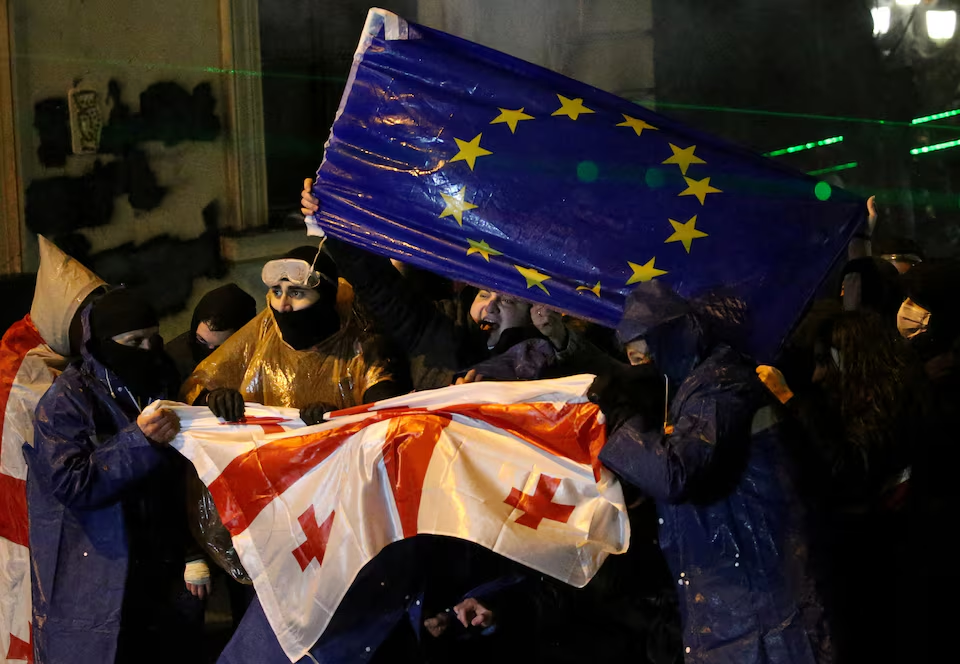
What’s Next for Georgia?
It was explicitly indicated that Georgia has now reached the crossroads. The decision of the government to put the EU accession talks on a pause opens the country up to Russian influence and alienates the Western allies.

Protesters are calling for:
- EU accession negotiation; the relaunch of accession talks.
- Elimination of oppressive legislation eradicating people’s rights of association, speech, and other related liberties.
- Conduct of highly transparent enquiries into electoral malpractices.
- Snap parliamentary elections.
The EU and the United States have called on Georgian authorities to reaffirm their commitment to the transatlantic track, saying that the lack of action may have ramifications.
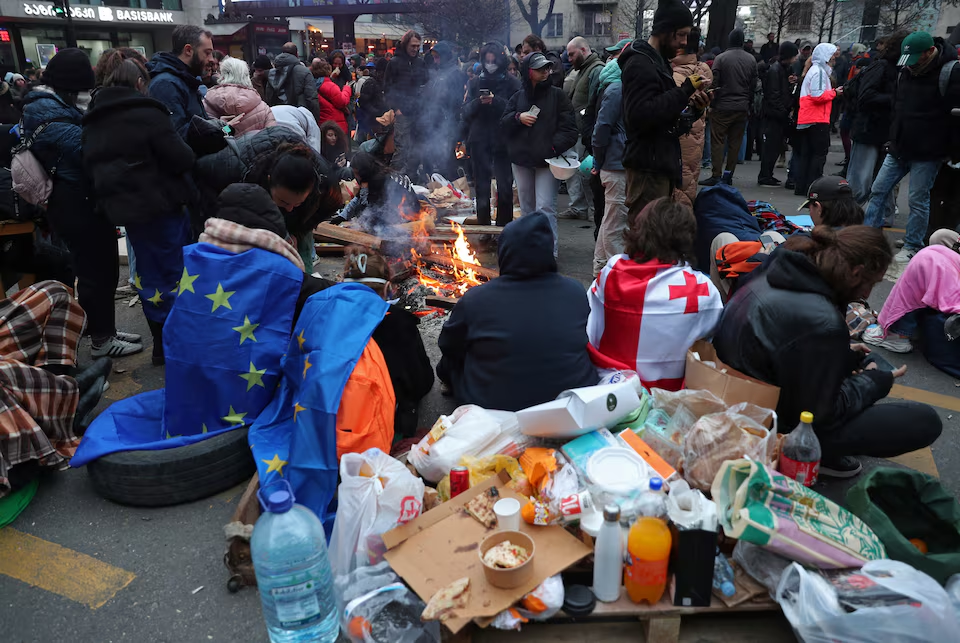
When demonstrations intensify and the world becomes more and more sceptical, the prospects for Georgia’s EU membership dim. For now, the streets of Tbilisi still resonate with the cry of a people who were ready to decide their own future.
With inputs from agencies
Image Source: Multiple agencies
© Copyright 2024. All Rights Reserved Powered by Vygr Media.

